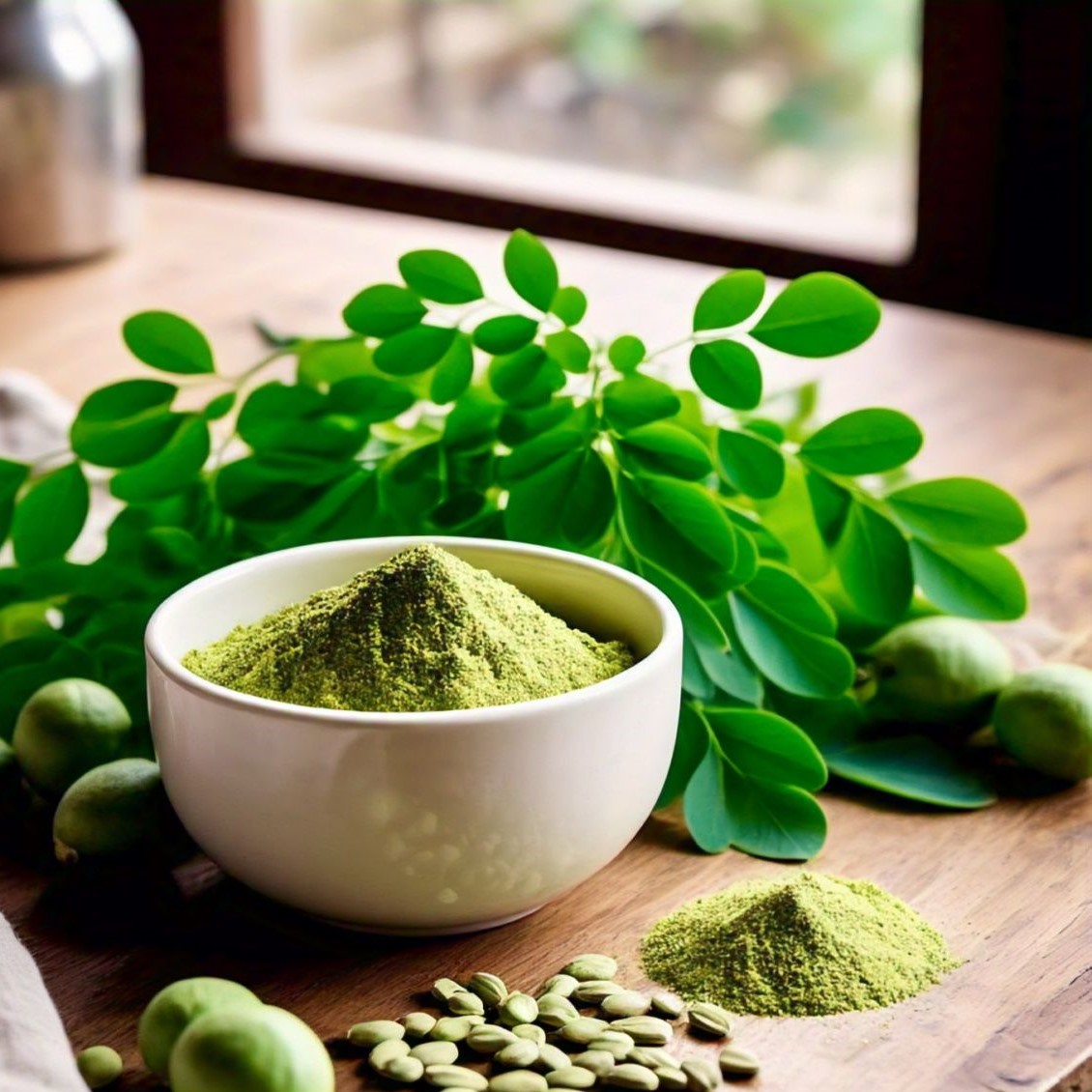Benefits of Moringa: A Nutrient-Packed Superfood
In the world of superfoods, few plants stand out like moringa. Known as the “miracle tree,” moringa has been praised for centuries for its incredible health benefits and powerful nutrients. Native to parts of Africa and Asia, every part of the moringa tree—including its leaves, seeds, and pods—has been used in traditional medicine for centuries. Recently, it has gained popularity as a modern-day health supplement. Let’s explore the many benefits that make moringa a top contender for your wellness routine.
What Is Moringa?
Moringa (Moringa oleifera) is a fast-growing tree that thrives in tropical and subtropical climates. Its leaves, which are often dried and powdered, are especially prized for their rich nutritional profile. Moringa is known to be packed with essential vitamins, minerals, antioxidants, and amino acids, making it a nutrient-dense plant. In fact, moringa leaves contain more vitamin C than oranges, more calcium than milk, and more iron than spinach, making it an outstanding addition to a well-balanced diet.
1. A Rich Source of Nutrients
Moringa is a true nutritional powerhouse. It is packed with essential nutrients, including:
- Vitamins: Moringa is loaded with vitamins A, C, and E, which support eye health, skin health, and immune function.
- Minerals: It contains high levels of calcium, potassium, and iron, all vital for bone health, proper nerve function, and oxygen transport in the body.
- Amino Acids: Moringa provides all nine essential amino acids, making it an excellent protein source for those who follow plant-based diets.
- Antioxidants: The plant contains potent antioxidants like quercetin and chlorogenic acid, which fight oxidative stress and protect the body from harmful free radicals.
With such a dense nutrient profile, moringa serves as a natural multivitamin to support overall health and well-being.
2. Boosts Immune System Function
The powerful antioxidants and high vitamin C content in moringa are key to its immune-boosting abilities. Vitamin C is essential for the production of white blood cells, which are responsible for defending the body against infections. Moringa’s antioxidant properties help reduce inflammation and enhance immune function, making it easier for the body to fight off common illnesses. Additionally, other nutrients in moringa, such as vitamin A and zinc, further contribute to a robust immune system.
3. Supports Digestive Health
Moringa is beneficial for digestive health due to its high fiber content, which aids in proper digestion and helps maintain regular bowel movements. It can be particularly helpful for preventing constipation. The anti-inflammatory properties of moringa also soothe the digestive tract, reducing issues like bloating and indigestion. By promoting better digestion and nutrient absorption, moringa helps ensure that your body is effectively processing food and absorbing essential nutrients.
4. Promotes Heart Health
Moringa has been shown to support heart health in various ways. One of the primary benefits is its ability to help regulate cholesterol levels. High levels of cholesterol, particularly LDL (bad cholesterol), are linked to an increased risk of heart disease. Moringa contains antioxidants like quercetin, which can help lower cholesterol and improve heart function. Additionally, the potassium in moringa helps maintain healthy blood pressure by relaxing blood vessels, promoting better circulation, and reducing the risk of hypertension. Overall, moringa’s heart-healthy properties make it an excellent choice for maintaining cardiovascular wellness.
5. Helps Regulate Blood Sugar
Moringa has shown potential in regulating blood sugar levels, which can be particularly beneficial for individuals with diabetes or those at risk of developing it. Some studies suggest that moringa can help lower blood sugar by improving insulin sensitivity and reducing blood glucose levels after meals. The plant’s antioxidant properties may also help protect against the damage caused by high blood sugar, which is often linked to diabetes-related complications. Incorporating moringa into a balanced diet could be a helpful strategy for those looking to manage their blood sugar levels naturally.
6. Increases Energy and Reduces Fatigue
Many people turn to moringa to combat fatigue and boost energy levels. Thanks to its high concentration of vitamins, minerals, and amino acids, moringa helps nourish the body, combat tiredness, and restore energy. Whether you’re feeling worn out due to stress, illness, or a hectic lifestyle, moringa provides the nutrients needed to revitalize the body. Its ability to enhance metabolism and improve nutrient absorption can also help increase stamina, making it a natural energy booster.
7. Promotes Healthy Skin and Hair
Moringa has been celebrated for its benefits to skin and hair health. The plant is packed with vitamin C and E, both of which are known to protect the skin from damage caused by free radicals and UV rays. These vitamins promote collagen production, which is essential for maintaining youthful, elastic skin. Additionally, moringa’s anti-inflammatory properties help reduce skin irritation, redness, and acne. Regular use of moringa, whether topically or as a dietary supplement, can help improve the appearance of the skin and protect it from premature aging.
For hair, moringa helps strengthen follicles, promote healthy growth, and reduce hair thinning. The vitamins and amino acids in moringa nourish the scalp and hair, helping to prevent dryness and dandruff while maintaining overall hair health.
8. Supports Cognitive Health
Moringa is also believed to support brain health. The antioxidants in moringa protect brain cells from oxidative stress, a key factor in cognitive decline. The high levels of vitamin C and E help improve memory and concentration by reducing inflammation in the brain. In addition, moringa’s ability to lower blood sugar levels may also help prevent cognitive issues associated with diabetes. Some studies even suggest that moringa may help reduce the risk of neurodegenerative diseases like Alzheimer’s and Parkinson’s, although more research is needed in this area.
Conclusion
Moringa is a truly remarkable plant with a wealth of health benefits. From boosting the immune system and supporting heart health to improving skin, hair, digestion, and brain function, moringa’s benefits are extensive and far-reaching. With its high concentrations of vitamins, minerals, amino acids, and antioxidants, moringa can enhance overall health and well-being. If you’re looking to incorporate this nutrient-dense superfood into your diet, consider using moringa powder, oil, or supplements to experience its powerful benefits. However, as with any new addition to your diet, it’s always a good idea to consult with a healthcare provider to ensure it’s the right choice for you.

